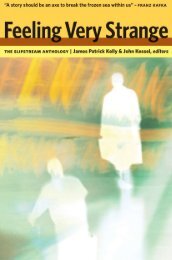The Curse of the Wer.. - Site de Thomas - Free
The Curse of the Wer.. - Site de Thomas - Free
The Curse of the Wer.. - Site de Thomas - Free
You also want an ePaper? Increase the reach of your titles
YUMPU automatically turns print PDFs into web optimized ePapers that Google loves.
NOTES<br />
64. O’Donnell, <strong>Wer</strong>wolves, pp. 52–53.<br />
65. Slavoj Žižek, Enjoy Your Symptom! Jacques Lacan in Hollywood and Out,<br />
revised edn (New York and London: Routledge, 2001), p. 136.<br />
Chapter 3<br />
1. Henri F. Ellenberger, <strong>The</strong> Discovery <strong>of</strong> <strong>the</strong> Unconscious: <strong>The</strong> History and<br />
Evolution <strong>of</strong> Dynamic Psychiatry (New York: Basic Books, 1970), p. 312.<br />
2. Mary Midgley, Beast and Man: <strong>The</strong> Roots <strong>of</strong> Human Nature (Brighton:<br />
Harvester Press, 1978), p. 43.<br />
3. Adam Douglas, <strong>The</strong> Beast Within: Man, Myths and <strong>Wer</strong>ewolves (London:<br />
Orion, 1993), pp. 93–4.<br />
4. Joseph Grixti, Terrors <strong>of</strong> Uncertainty: <strong>The</strong> Cultural Contexts <strong>of</strong> Horror<br />
Fiction (London and New York: Routledge, 1989), p. 95.<br />
5. Ibid.<br />
6. S. Freud, ‘“A Child is Being Beaten”: A Contribution to <strong>the</strong> Study <strong>of</strong> <strong>the</strong><br />
Origin <strong>of</strong> Sexual Perversions’, in J. Strachey (ed.), <strong>The</strong> Standard Edition<br />
<strong>of</strong> <strong>the</strong> Complete Psychological Works <strong>of</strong> Sigmund Freud, vol. 17 (London:<br />
Hogarth Press, 1955), pp. 203–4.<br />
7. As Bryan Turner has suggested, ‘<strong>the</strong>re is good evi<strong>de</strong>nce to believe that<br />
much <strong>of</strong> <strong>the</strong> Freudian view <strong>of</strong> <strong>the</strong> relationship between suppressed sexuality,<br />
neurosis and civilization was an application <strong>of</strong> Nietzsche’s critical<br />
philosophy’. Bryan Turner, ‘<strong>The</strong>oretical Developments in <strong>the</strong> Sociology<br />
<strong>of</strong> <strong>the</strong> Body’, Bodies: Australian Cultural History 13 (1994), p. 18.<br />
8. S.Freud, cited by Richard Wollheim, ‘Introduction’ to S. Freud, <strong>The</strong> Case<br />
<strong>of</strong> <strong>the</strong> Wolf-Man: From <strong>the</strong> History <strong>of</strong> an Infantile Neurosis (1918) (San<br />
Francisco: Arion Press, 1993), p. 14.<br />
9. <strong>The</strong> Wolf-Man (Sergei Pankejeff), ‘My Recollections <strong>of</strong> Sigmund Freud’,<br />
trans. Muriel Gardiner, in M. Gardiner (ed.), <strong>The</strong> Wolf-Man (New York:<br />
Basic Books, 1971), p. 146.<br />
10. Carlo Ginzburg, ‘Freud, <strong>the</strong> Wolf-Man, and <strong>the</strong> <strong>Wer</strong>ewolves’, in C. Ginzburg<br />
, Clues, Myths and <strong>the</strong> Historical Method, trans. J. and A. Te<strong>de</strong>schi<br />
(Baltimore: Johns Hopkins University Press, 1992), pp. 147–8.<br />
11. In fact, <strong>the</strong> Wolf-Man was born on 6 January 1887 by <strong>the</strong> Gregorian calendar,<br />
and Christmas 1886 by <strong>the</strong> Julian calendar used in Russia.<br />
12. Ginzburg, ‘Freud, <strong>the</strong> Wolf-Man, and <strong>the</strong> <strong>Wer</strong>ewolves’, p. 148.<br />
13. Gardiner, ‘Introduction’ to <strong>The</strong> Wolf-Man ( Sergei Pankejeff), ‘<strong>The</strong> Memoirs<br />
<strong>of</strong> <strong>the</strong> Wolf-Man’, trans. Gardiner, in Gardiner (ed.), <strong>The</strong> Wolf-Man,<br />
p. 4.<br />
14. Ginzburg, ‘Freud, <strong>the</strong> Wolf-Man, and <strong>the</strong> <strong>Wer</strong>ewolves’, p. 154.<br />
15. Ibid.<br />
163





